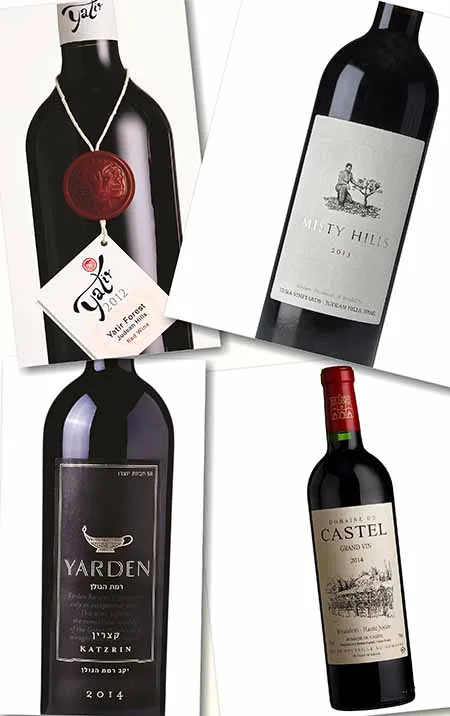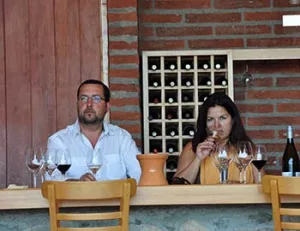The image of a food product with the word ‘Kosher’ used to describe it, is enhanced. However, with regard to wine, the connotation is usually negative. People think this must mean the wines are sweet, oxidized, cooked and undrinkable. This mistaken perception could not be further from the truth.
Kosher food and wine are necessary for Jews who observe the Jewish Dietary Laws. The word ‘Kosher’ means pure and is used in slang to describe something that is considered all right, okay or authentic.
You will know a product is Kosher from a small abbreviation or stamp on the tin or package. Many of the most famous food and beverage brands are kosher. The regular consumer will not be aware of this or even care, as it does not affect the quality of the end product.
Regarding wine, the stamp is usually placed on the back label. It is something of little importance to either to non-Jewish consumers or to those Jews who do not keep kosher. However, to the religious or observant Jew, it is crucial, and they will know how to find it.
Making kosher food involves observing rules, based on the source of the food. Rules like not eating pork, shellfish or mixing milk and meat are to the fore. Kosher wine though is based on the handler. The workers touching the wine and winemaking equipment have to be observant religious Jews.
The kosher wine laws are some of the oldest in the world. The agricultural laws come from the Bible and the winemaking rules date from about 2,000 years ago, at the beginning of the Jewish diaspora. However, the consumer should regard the kosher stamp as an additional piece of information, in the same way that ‘sustainable vineyards’, ‘organically grown’ or ‘suitability for vegans’ may be part of the explanation on the back label. Regard the Kosher designation rather like an ISO checking system where everything involved in the winemaking process is monitored and traced back to source.
Kosher is not a country or a style category. Kosher wine may be made in every wine producing country, from every variety and in every wine style. It is made in the same way as non-kosher wine. The same Cabernet Sauvignon grape is grown in the same way whether in Napa Valley, Bordeaux or Galilee, whether kosher or not. The winemaker will have studied at the same winemaking school and university as his non-kosher counterpart. The technology and winery equipment will be the same. In fact, the whole winemaking process, including the harvesting, fermentation, bottling and aging, will be the same for a kosher wine as a non-kosher wine.
Israel has world class kosher and non-kosher wines. When the world’s most famous critics tasted and ranked the best Israeli wines, the kosher wines often finished first, proving the point that being kosher was not detrimental to quality.
The success of Israeli kosher wines in competitions and tastings against non-kosher wines, proves the point more emphatically. This why wines are marketed as ‘Israeli wines from the Eastern Mediterranean’, rather than ‘Jewish, kosher wines for an ethnic market’. As such wineries like Domaine du Castel, Flam Winery, Golan Heights Winery, Tzora Vineyards and Yatir Winery produce world class, award winning wines, which just happen, also, to be kosher.
Be careful not to confuse quality kosher table wines with sacramental wines. Wines like \”Manischewitz\”, \”Kedem\” & \”Palwin\” are sacramental wines, which Jews refer to as \”Kiddush wines\”. They may be kosher, but they are primarily for religious ritual. No-one avoids regular wine because Altar & Communion wine are not the best. Likewise, no-one should assume \”Manishchewitz\” represents kosher wine.
Wine is an important part of Judaism. Every festival or lifestyle event includes wine at its center, Wine even has its own special blessing. The grape was one of the Blessed Species in the Bible, and wine, particularly wine made in Israel, the Holy Land, has an exalted status in the Judeo Christian world.
Next time you taste an Israeli wine, taste and judge it as a wine. The ‘K’ word should only be of interest to the observant Jew. As the Wine Advocate said “the kosher designation is irrelevant to quality.” Don’t let the ‘K’ word impair your enjoyment of any wine!
Adam Montefiore has advanced Israeli wine for over 30 years. He is referred to as the ambassador of Israeli wine and is the wine writer for the Jerusalem Post. www.adammontefiore.com


















